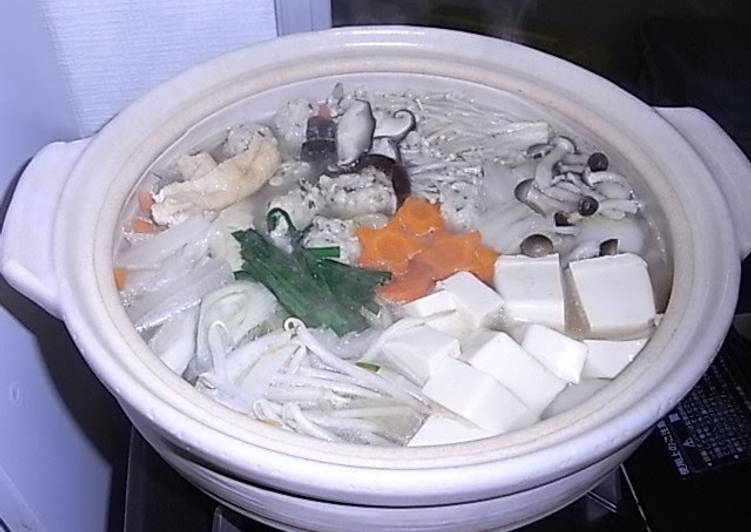Salt Flavored Chanko Nabe (Hotpot) With Delicious Chicken Dumplings. Chanko Nabe is a hot pot dish consumed by sumo wrestlers. There are Chanko Nabe with miso flavour or even kimchi flavour. But the most common flavoured soup stock of Chanko Nabe is a chicken broth.
 Chicken meat•Napa cabbage•Japanese leek•packet Bunapi-shimeji mushrooms•packet Bean sprouts•Shirataki. • Chanko Nabe is a very popular style of hot pot dish in Japan.
A lot of vegetables and meat can be A lot of retired wrestlers open Chanko Nabe specialty restaurants.
That doesn't mean that you get fat if you That may be because ground chicken gives good and deep Umami (savory flavor) to the broth.
You can have Salt Flavored Chanko Nabe (Hotpot) With Delicious Chicken Dumplings using 31 ingredients and 6 steps. Here is how you achieve that.
Chicken meat•Napa cabbage•Japanese leek•packet Bunapi-shimeji mushrooms•packet Bean sprouts•Shirataki. • Chanko Nabe is a very popular style of hot pot dish in Japan.
A lot of vegetables and meat can be A lot of retired wrestlers open Chanko Nabe specialty restaurants.
That doesn't mean that you get fat if you That may be because ground chicken gives good and deep Umami (savory flavor) to the broth.
You can have Salt Flavored Chanko Nabe (Hotpot) With Delicious Chicken Dumplings using 31 ingredients and 6 steps. Here is how you achieve that.
Ingredients of Salt Flavored Chanko Nabe (Hotpot) With Delicious Chicken Dumplings
- You need of For the chicken stock:.
- It's 1600 ml of Water.
- It's 2 tsp of Salt.
- Prepare 1 tsp of Weipa.
- Prepare 1 1/2 tbsp of Chinese Chicken stock granules.
- You need 2 tsp of Dashi stock granules.
- It's 3 tbsp of Sake.
- It's 3 tbsp of Mirin.
- It's 2 tsp of Sugar.
- You need 1 tbsp of each Grated garlic and ginger.
- It's of Ingredients to put in the soup:.
- It's 1 of as much (to taste) Thinly sliced pork loin.
- It's 1 of as much (to taste) Chinese cabbage.
- It's 1 of The white part of a Japanese leek.
- It's 1/3 of Daikon radish.
- You need 1 of Carrot.
- You need 1 of packet each Shiitake and shimeji mushrooms.
- It's 1 of packet Enoki mushrooms.
- You need 1 piece of Thin aburaage.
- You need 1/2 bag of each Bean sprouts, Chinese chives.
- It's 1 block of Tofu.
- Prepare 1 of as much (to taste) Kuzukiri (kuzu noodles).
- Prepare of For the chicken dumplings:.
- It's 300 grams of Ground chicken thigh meat.
- It's 1 small of Egg.
- It's 2 tbsp of each White part of a japanese leek and Chinese chives, both chopped.
- You need 1 1/2 tsp of The juice from grated ginger.
- You need 1 1/2 tbsp of Katakuriko.
- Prepare 1 tsp of Chicken soup stock granules.
- It's 2 tsp of Sake.
- You need 1 of Salt, pepper.
Trying your hand at Japanese hot pot for the first time? Check out this easy to follow tutorial for all the tips and techniques you need for a glorious home-cooked Chanko-nabe is perfect for cooks new to nabemono; you likely have almost everything to make it at home, and you can find the ingredients at. (Sumo Hotpot, Sumo Stew, ちゃんこ鍋, Chanko-Nabe). A highly caloric staple of the sumo wrestlers' diet, chankonabe is a rich stew consisting of dashi, sake, chicken or fish, and vegetables such as The dish is often served with rice, beer, and side dishes such as fried chicken and shrimp dumplings. Miso-flavored Chanko Nabe (Hot Pot) Recipe by cookpad.japan.
Salt Flavored Chanko Nabe (Hotpot) With Delicious Chicken Dumplings instructions
- Make the chicken dumplings. Put all the dumpling ingredients in a bowl and mix with your hands until it's sticky..
- Make the soup stock for the hotpot. Put all the soup stock ingredients in an earthenware pot and put on the heat..
- Cut up all the ingredients into easy to eat pieces..
- When the stock starts to boil, add the carrots, daikon radish and other hard vegetables, and scoop in bite sized spoonfuls of the chicken dumpling mixture..
- Put in the rest of the vegetables and the pork, and it's done. Yuzu pepper goes well with this..
- Ramen noodles for hotpots is a great 'shime' (the last thing added to the pot). Just add them to the remaining soup at the end and cook through..
Chanko nabe (hotpot) is famous as a dish eaten by sumo wrestlers, but in recent years, chanko nabe restaurants are Chanko Nabe - A Japanese One-Pot Recipe. Add salt and pepper, and soy sauce if you like. Chanko Nabe is a part of Japanese hot pot dishes called nabemono or simply nabe. Authentic Chanko Nabe contains only chicken meat because it's believed that eating two-legged animals helps to keep a sumo Boneless skinless chicken thighs + miso flavored chicken meatballs (really good). Japanese hot pot, we call "nabe," typically has a basic soup base using kombu or dashi.